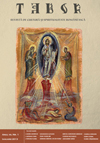Noua programă de studii pentru ora de religie Este Îndrumător spre religia universală
The New Curriculum for the Religion Class is A Guide to Universal Religion
Author(s): Gheorghios KapsanisSubject(s): Christian Theology and Religion
Published by: Renaşterea Cluj
Keywords: religion class, religions, Greece, Athos, atheism, New Age
Summary/Abstract: In our lesson, the problem raised by father abbot Gheorghios Kapsanis is on one hand, the one of the lack of philosophical-religious criteria in elementary, middle, and high school students (in any case, it is clear that we can’t talk about critical thinking before high school), as well as that of relativizing the uniqueness of the truth of faith and of the lack of spiritual commitment in this so-called cold and impartial presentation of all religions, presentation based on either New-Age relativism and the Pan-Religion of Brave New World or, equally serious, on the agnostic or atheistic relativism. On the other hand, Greece is not a country that distinguishes itself through a globalized, cosmopolitan, and multi-religious society—as long as 90% of the population declares Orthodox—and in this context, the case of Greece is relevant for Romania too. So, the socio-cultural necessity postulated by EU does not fi t the Hellenic realities. Further, father elaborates a short history of the emergence and continuity of Orthodox religious classes in Modern Greece, following the Turkish ruling, showing that the bases it was built on back then were correct, democratic, non-discriminating, and still valid in the actual context of the Hellenic state. Even though some personalities in the contemporary fi eld of religious teaching have been seduced by politically correct Modernist ideas or ideas of different nature, the religion class must remain a class that cultivates the religious feeling specifi c to the spiritual-cultural identity of the citizens of Modern Greece, in the spirit and praxis of Holy Fathers and Byzantine Teachers, or, better said, roméi (a refl ex of the romaic double Eastern or “Byzantine” ruling, the Greek state, which owes a great part of its contemporary physical and cultural existence to the Orthodox Church, considers by Constitution Orthodoxy as national religion and the Orthodox Church as a power in state, priests being assimilated to civil servants) and must not become study without the Holy Spirit, a scholasticism, a Modern varlaamism where, as a Thessalonian father said a few years ago, it speaks about the palamite (hesychastic) existence with a varlaamic-scholastic language and spirit. Or, better said, neo-varlaamic and neo-scholastic. Father concludes that it’s better to have no religion class whatsoever than to let our young be indoctrinated with atheism or agnosticism by anthropocentrism or paganized by the syncretistic New Age spirit of the pilot hour (so, actually, indoctrinated with atheism or with other religion, and yet, on tax payer’s money). Just like in the times of Turkish ruling, rough conditions require survival solutions, and the young will survive spiritually by the education received in family and in various catechetic activities Orthodox Greek parishes are fi lled with—which is, we must admit, far ahead of us at this level because it didn’t have to deal with the communist regime in the past...
Journal: TABOR. Revistă de cultură şi spiritualitate românească
- Issue Year: VII/2013
- Issue No: 01
- Page Range: 17-24
- Page Count: 8
- Language: Romanian
- Content File-PDF

